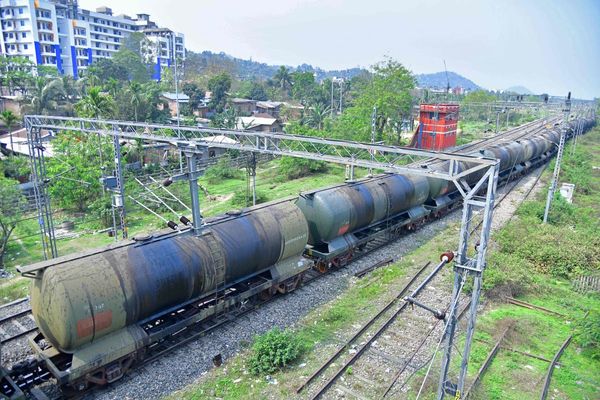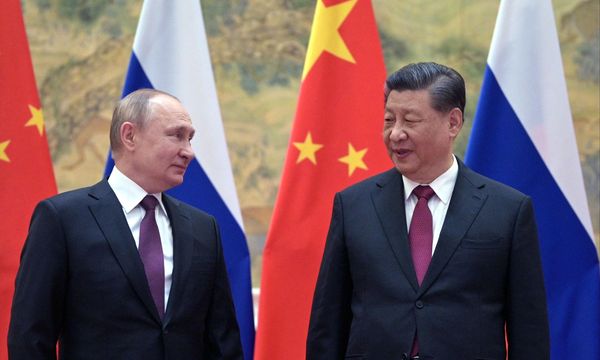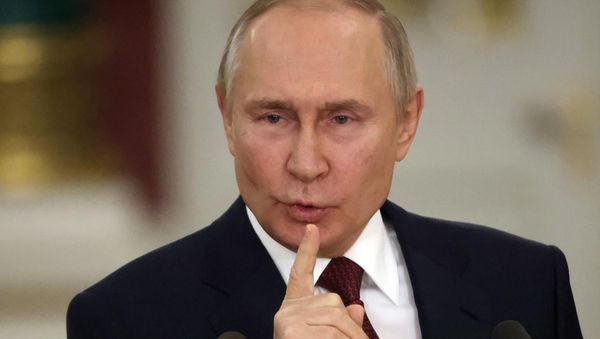
As many Western countries have weaned themselves off their reliance on Russian materials and imports since the invasion of Ukraine, China has remained Vladimir Putin’s closest major ally, continuing to buy Russian fuel and largely refusing to join the international chorus of condemnation against his invasion of Ukraine. But with Russia struggling to gain ground in Ukraine, a major intelligence chief in the United States called Putin’s efforts a “huge strategic failure for Russia” that has helped cement a Western coalition in support of Ukraine and may eventually make Russia economically subservient to another major power.
China has toed the line between respecting Ukraine’s sovereignty and abstaining from criticizing Russia for starting the war over the past year. Chinese leaders have recently positioned themselves as peacemakers in the conflict, even deflecting blame to the U.S. for prioritizing its own economic interests and aggravating the crisis through sanctions on Russia. But this could all turn out to support China’s economic interests.
“If you look at the reality, Russia is becoming more and more dependent on China, and in some respects it risks becoming an economic colony of China over time,” William Burns, director of the Central Intelligence Agency, said Tuesday during an event at Rice University, in Houston.
Between Western companies leaving the country and multiple waves of unprecedented international sanctions, the Ukraine war has dealt a body blow to Russia’s economy. Russian GDP fell by 2.2% to 5.9% last year, according to estimates from the World Bank, the IMF, and the OECD. Its economy could shrink by a further 2.5% this year in a scenario calculated by the OECD.
Russia was forecasted to fare much worse in the early days of the war, but its economy was temporarily spared by a surge in oil and natural gas prices, which had yet to be targeted by Western sanctions. Russia earned a record 93 billion euros, or $102 billion, in fossil fuel exports during the first 100 days of the war alone, according to a June study.
But 2023 promises to be a different story. With European embargos on Russian coal and refined oil products now in place and European natural gas prices falling 86% from their peak last August, one of Russia’s remaining economic lifelines has been cut. China has stepped in over the past year to support Russia’s floundering energy export economy, which in 2021 accounted for 45% of the country’s federal budget. Soaring purchase volumes for Russian fossil fuels have been a bargain for China, which was able to acquire oil at a nearly 40% discount and gas at 50%, but keeping the relationship alive is quickly becoming a matter of survival for Russia.
Burns said Russia is becoming dependent on China for exports of “energy resources and raw materials,” in an alliance that is becoming rapidly unbalanced and a potential geopolitical concern for Putin, who risks become overreliant on a foreign actor.
“That all adds up in my view to a huge own goal for Putin’s Russia right now,” he said, with Putin’s reliance on Chinese President Xi Jinping as an export partner representing a strategic failure that will leave Russia with a short list of tenuous economic allies for the foreseeable future.
In some ways, Russia’s reliance on China has been set in stone since the invasion over a year ago. With Europe no longer a reliable gas export partner, Xi and Putin jointly announced plans in March for a new gas pipeline: The Power of Siberia 2, which will export natural gas to China via Mongolia, is slated to deliver at least 98 billion cubic meters of gas a year by 2030. Last year, Russia supplied China with 15.5 billion cubic meters of gas.
Russia’s material dependence on Chinese buyers has not been lost on Moscow officials, who see trade between the two countries as a cornerstone of Russia’s strategy to win the war in Ukraine and weather sanctions, the Financial Times reported last month, citing an unnamed source close to the Kremlin.
“The logic of events dictates that we fully become a Chinese resource colony,” the person said. “Our servers will be from Huawei. We will be China’s major suppliers of everything. They will get gas from Power of Siberia. By the end of 2023 the yuan [renminbi] will be our main trade currency.”
To be sure, Russia’s war in Ukraine is not entirely in China’s political interests. While an economically beneficial relationship, Russia may have also become a “burden” to China, Antonio Fatas, an economist and professor at the Insead business school in France, told CNBC Monday, adding that China wants to be seen as “leaders of the world, not leaders of the world that is causing war in Europe.”
Xi continued to play peacemaker earlier this month when top European leaders visited Beijing, and China is currently steering clear of turning its economic alliance with Russia into a military one by supplying Putin with Chinese arms, a move U.S. officials have actively discouraged.
Weeks before Russia invaded Ukraine, Putin and Xi declared a “no limits” friendship, but the long war has tested that relationship. Burns said that while the partnership between Xi and Putin today is a “strong one,” an overt military engagement with the West, or an escalation of nuclear warfare rhetoric from Putin, might still represent a limitation to how far China is willing to go. “To the best of our intelligence, Xi’s China has not yet provided weapons and ammunitions to Russia,” he said.
“It’s an important partnership. I think both leaders are committed to it. But it’s so far at least not a friendship without limits.”










